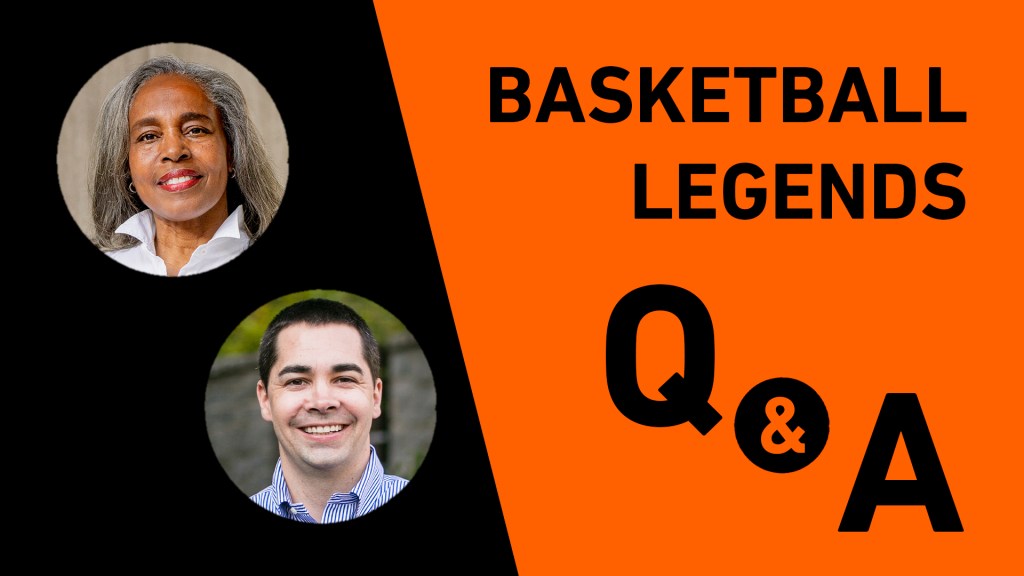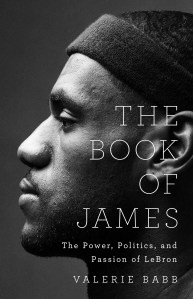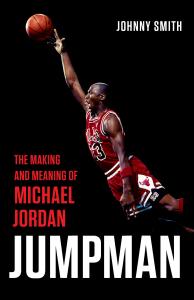Basketball Legends Q&A (Authors discuss Lebron and MJ)

The authors of THE BOOK OF JAMES and JUMPMAN share more about their process and expectations for their books about basketball legends Lebron James and Michael Jordan.
What compelled you to write this book? What was unique about this story that made you want to invest your time and dig into it, as opposed to another project?

When I look at LeBron James, I frequently see my own son, also a tall, athletic, black man. Though their lives could not be more different, the things they have in common are shared by many black men: their mothers’ hopes that they never walk down the wrong street and meet the wrong police officer; the knowledge that no matter how well they have been raised, they can become a statistic in a matter of random seconds. I don’t know Gloria James, but I know that some part of her is just grateful that Lebron James was able to grow up and that his life wasn’t taken too soon or that she didn’t have to start a Go Fund Me page. I was compelled to write the book because I am tired—tired of black children having their futures taken away through inferior education before they even enter kindergarten, tired of how America exploits black culture and gives no respect to the people creating it; tired of Black invisibility, and James, as a super nova, is one of the most compelling ways of showing how and why all this is just so wrong.
It seems obvious to say that James is unique, but he is so unique you want to say it. I admired him as a basketball star but admired more the way he navigates American culture as a Black man, and that is his specialness. That he proudly embraces being black when so many who become Black superstars want or are encouraged to minimize their blackness is an example. “I don’t see color”; “I don’t think of myself as Black”; “I want to be known as a __ [fill in the blank] __ not a Black __ [fill in the blank] __,” and the like are statements James would never make because he sees Blackness as excellence, not hindrance. He keeps his eyes on the prize asserting the value of Blackness in multiple media and on multiple platforms. The practice in the United States has always been to make Blackness feel like a stranger in its own home, a home that its unpaid labor force of enslaved people built and a home whose cultural creativity—blues, jazz, rock and roll, hip hop, vernacular speech—made American culture something more than just an imitation of European. There’s an old saying, you can’t win the game playing by someone else’s rules. Even a young LeBron James knew this, and he has set his own terms and never looked back.
Growing up in the northern suburbs outside of Chicago, Michael Jordan was my childhood hero. I belonged to the generation of kids who wanted to “Be Like Mike.” Looking back on that time as a historian, however, I wanted to better understand how Jordan came to be seen as a hero for different groups of Americans and a symbol of the country’s racial progress. What did it really mean to “Be Like Mike?” What made him an ideal hero for America during the late 1980s and 1990s? How did race influence the way Jordan viewed himself and the way Americans viewed him? Exploring those questions, I explain how the NBA, Nike, and the sports publicity machine molded Jordan into a heroic role that transformed him into a myth—a myth shaped by white America’s tenuous acceptance of Black heroes. Although sportswriters claimed that Jordan “transcended race,” in Jumpman, I argue that his racial consciousness and the country’s ongoing racial conflicts configured the way he presented himself to the world.

What was something interesting or surprising that occurred along the journey and research? What stood out to you as being something you might not have expected?

I knew James was disciplined. You don’t become the type of athlete he is without being so. From interviews I could tell he was sharp, the witty and on-point responses. What I was not prepared for was his vision. The basketball sense he shows on court—knowing where a pass is going before it’s thrown, where a player will be before getting there—is evident beyond the court. It was a vision that led him to know that his four friends, and
not the financial powers that be, would be the best stewards of his fortune and make him a billionaire? Over and over, I kept asking how did he know in his 20s what it takes others living until their 70s to know? How did he know how to transition from high school to the NBA without falling into the pitfalls of managers, agents, hangers-on, and other Don King-styled exploiters? How did he know that the most successful way to make an intervention into education wasn’t to establish a private or charter school but to commit to the mission of public education?
If the basketball thing hadn’t worked out, James could still have made a fortune writing self-help books: how to develop the mental discipline and motivation to get up every morning and engage in a punishing workout; how to build your financial future using your own “crew”; how to be a husband and father in a nation that sees Black men only as loafers and threats.
The most surprising aspect of Jordan’s life was that early in his professional career, he embraced the idea of colorblindness—denying the existence of race and promoting the idea that everyone was equal. However well-intentioned, it was Jordan’s way of conveying that he did not harbor resentment or hostility toward white America. During a 60 Minutes interview in 1987, he told Diane Sawyer, “When [people] think of Michael Jordan, I don’t want them to think that he’s black or white. I want them to think of him as a person.” Jordan framed America as a great meritocracy where race did not matter, an appealing ideal to people who had grown tired of hearing about the persistence of racism and inequality. Throughout his career with the Chicago Bulls, Jordan hardly ever revealed any frustration about racism or his own personal struggles with discrimination. It was an intentional choice that allowed him to achieve universal acceptance from an audience that wanted to believe that racism dissolved during the Civil Rights Movement.

What do you hope people will take away from your book after reading? What do you hope they’ll say about it to their friend?

I would like people to see this book as a blueprint that uses LeBron James to outline how racial politics lead to human beings no longer recognizing their shared truths. I would like people to realize that LeBron James is part of a legacy of Black athletes urging the United States to live up to the great idea at its root: liberty and justice for all. This book is a celebration of James as polymath: once-in-a-lifetime athlete, savvy entrepreneur, intellectual, decent human being. What would I want someone to tell their friends? Any of the following:
“You gotta read this—even if you’re not into basketball you are into Black.”
“This book puts LeBron in a whole new light.”
“This is the best book I’ve ever read.”
Most importantly, I hope the book is seen as a keen analysis of what the intersections of blackness and basketball can teach us.
My hope is that readers will have a better understanding of how Jordan navigated the country’s complex racial politics during his pursuit of his first NBA championship. Although Jordan was criticized for avoiding politics during his playing career, the fact remains that Jordan, a product of the conservative 1970s and 1980s, would have never become America’s most famous pitchman, or an NBA owner for that matter, if he had been an outspoken civil rights activist.

LeBron James is the hero in two very American tales: one, a success story the nation loves; the other, the latest installment in an ongoing chronicle of American antiblackness. He’s the poor boy from a “broken” home who makes good. He’s also the poor Black boy from a “broken” home who makes good, then at the apex of his career finds “n*****” spray-painted across the gate to his home.
James has lived in the public eye ever since high school when his extraordinary athletic skills subjected his every action, every statement, every fashion choice to intense public scrutiny that tells us less about James himself and more about a nation still wrestling with many social inequities. He uses his celebrity not to transcend Blackness, but to give it a place of cultural prominence, and the backlash he receives exposes the frictions between Blackness and a country not fully comfortable with its presence. As a result, James’s story is a revelatory narrative of how much Blackness is loved, hated, misunderstood, and just plain cool in an America that has changed and yet not changed at all.
To become the most revered basketball player in America, it wasn’t enough for Michael Jordan to merely excel on the court. He also had to become something he never intended: a hero.
Reconstructing the defining moment of Jordan’s career—winning his first NBA championship during the 1990-1991 season—sports historian Johnny Smith examines Jordan’s ubiquitous rise in American culture and the burden he carried as a national symbol of racial progress. Jumpman reveals how Jordan maintained a “mystique” that allowed him to seem more likable to Americans who wanted to believe race no longer mattered. In the process of achieving greatness, he remade himself into a paradox: universally known, yet distant and unknowable.
Blending dramatic game action with grand evocations of the social forces sweeping the early nineties, Jumpman demonstrates how the man and the myth together created the legend we remember today.

